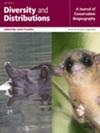Detections of Rare Species Lead Citizen Scientists to Initiate Data Recording
Abstract
Aim
Citizen science data are increasingly used to monitor biodiversity but come with several challenges that can impair accurate ecological conclusions. We explore how observers' preferences for certain species over others bias the initiation of survey efforts and assess the extent of this sampling bias in semi-structured citizen science datasets. We investigate the effects of this bias on occupancy model-based species distribution models and offer suggestions for mitigating this when analysing citizen science data.
Location
Great Britain, with methods applicable to citizen science datasets worldwide.
Methods
We assess observer species preferences in list initiation via two methods: (1) indirectly through exploration of the relationship between species rarity and survey duration and (2) directly through analysis of the first-recorded species on surveys. We use these results to assess the impact of list-initiation sampling bias on occupancy models of 132 common breeding birds across Britain.
Results
We find evidence for list-initiation sampling bias in British eBird and BirdTrack data. This bias is driven by observer preferences for certain species over others, with species preferences correlated with species rarity. This bias was stronger in short-duration surveys, and removing short surveys to remove these biased lists had limited impacts on occupancy models.
Conclusions
Citizen science schemes projects that allow observers freedom in how they observe and record biodiversity consequently have more heterogeneous datasets. Observer species preferences lead to biased initiation of surveys and consequent overreporting of some species. Although we find limited effects of this bias on occupancy models in our study, we nevertheless suggest analysts consider its possible effects when exploring and analysing citizen science data.


 求助内容:
求助内容: 应助结果提醒方式:
应助结果提醒方式:


